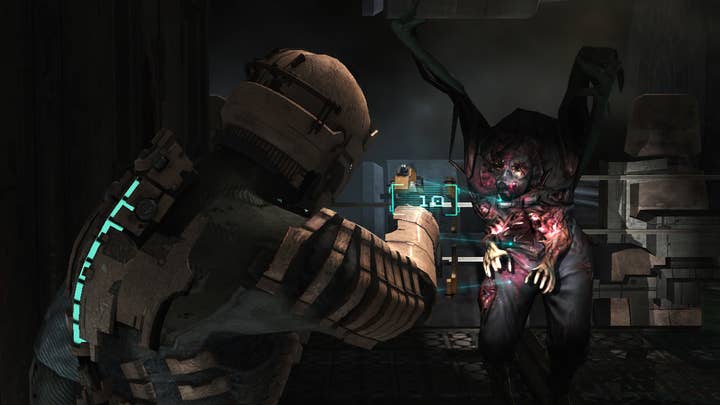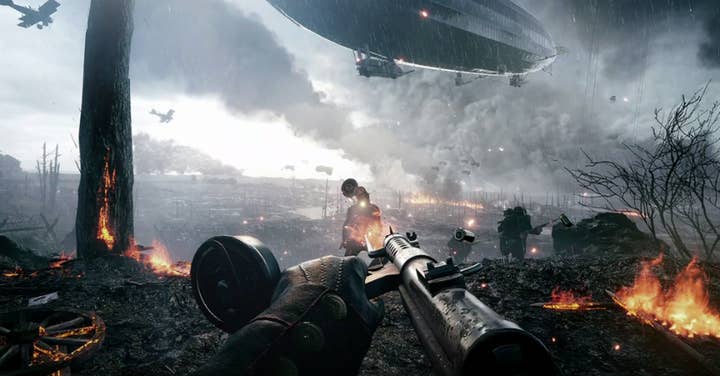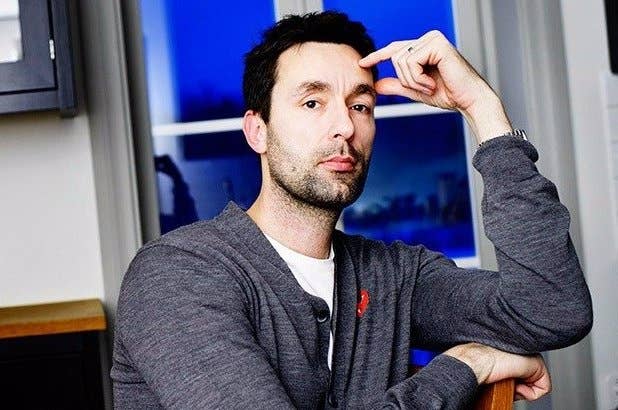EA: "Our industry has become better at understanding what's going to work"
The risks of the past may not be taken today, says Patrick Söderlund, but that's down to a clearer perception of what the audience wants
My meeting with Patrick Söderlund takes place in a building site. With less than a day to go before Gamescom officially opens, what will eventually be EA's sprawling business area is still a work in progress; a flurry of hammering and talking and relentless activity. Söderlund, by contrast, appears entirely at ease, making the final preparations for a press conference in which EA will showcase Battlefield 1, Titanfall 2 and FIFA 17, among others - arguably the strongest line-up from any major publisher at Europe's biggest consumer event.
And yet it's difficult to avoid the way the AAA market has changed in the space of a console generation. Almost three years into the life of the Xbox 360 and PlayStation 3, EA was preparing to launch a string of entirely new IPs: Army of Two, Dead Space, Mirror's Edge, Dragon Age: Origins, Spore. In this interview, Söderlund discusses the various factors that have contributed to that shift in AAA development, why it might actually be better for the players, the original games that EA is working on behind-the-scenes, and how supporting indie developers can help to fill in the gaps.
That's fair, but what you have to understand that Frostbite today isn't necessarily one engine. It is the base of an engine, yes, and there's rendering and a lot of other layers are kind of generic, in the sense that every game team is going to adapt Frostbite to do what that game team needs it to do. What then happens is the Frostbite team migrates code that was written by specific game teams into the main branch.
"We don't dread a console transition or new machines. We kinda like it"
A couple of years ago we didn't have a good cinematic tool. When Bioware made Dragon Age: Inquisition they wrote a detailed and robust tool, because they needed that for narrative storytelling. That was made by Bioware and then migrated back into the main branch of Frostbite, which, by the way, FIFA is now also using for its story mode, The Journey. This is how it works, but it doesn't mean that I think there's an engine that can do anything. Everything needs to start from something, and every game team is going to have to go in and make specific alterations and additions to the engine to suit their needs.
If you look at those consoles, they essentially share a PC-based architecture to some extent - with similarities to PC, at least. We already run super high-end PC at 4K. That's something we support today, including DX12, so it's not hard for us to see our games scale up and down. And, frankly, it's a lot easier to go up than down.
We think it's awesome that Microsoft and Sony are making new consoles, and better consoles - as consumers and as game creators - but we don't see it as a challenge. I think that's because we've set ourselves up for transition, by being quite savvy about how we look at technology.
It all stems from the kind of architecture you decide to have. Whether you have something that's scalable, that is a modular system, rather than a secluded system or a closed system. Frostbite is a modular engine where you can remove parts and add parts to it. We don't dread a console transition or new machines. We kinda like it.

There's two issues there, and I think the technology is a separate discussion. I think with our industry in general, there are maybe fewer titles today because the cost of development has gone up. At the same time, for us, I understand why it may appear that's what we're doing, if you look at what we have here [at Gamescom]. But we have a big portion of our workforce dedicated to new IP today. New IP that we haven't shown yet.
For me, the technology is actually an enabler. With one technology, you can have a tools team focusing on ease of prototyping. Also, from an asset perspective, we have a database of Frostbite generated assets today that is humongous, so if a development team wants to conceptualise something or proof something, they can just take assets from any game we've shipped and start toying with them. It's almost like a construction kit. That can be very helpful.
That said, we are constantly looking at how we can be better in this area, how we can evolve, and make it more efficient and easier for people to express themselves.
I think yes and no. We're developing our games in much closer collaboration with players, and we're listening more to what they want. That, in itself, is driving longer engagement, where people want to stay with our games for a longer time. As a result of that we're seeing larger player populations, and the games are becoming very successful.
"A company the size of EA, and a development organisation of the size that I oversee, we have an obligation to push the industry forward"
At the same time, though, the beauty of game development - the beauty of any type of entertainment - is that people don't know what they don't know. For us, that's what we need to think about. That's a big portion of why we exist. If we just continue to build on what we already have - which is also a portion of what we do, because the company needs it, the players really want it - and we don't push ourselves towards the unknown... A company the size of EA, and a development organisation of the size that I oversee, with more than 5,000 people, we have an obligation to push the industry forward. I feel obligated to give people something new to play.
The perception of World War I to most people, it's so long ago that younger people may not even know much about it.
Yeah, it's that long ago. The second thing is that, in people's minds, World War I was grey, it was brown, it rained a lot, and it was all in trenches. In school, in movies, in documentaries, that's how they portray the war. What people don't know, and what the development team opened my eyes to, was two things: the fact that it was a truly global conflict, which opens up some pretty interesting scenery for us as game makers; the second thing, the start of the war in 1914 was on the backs of horses with swords and simplistic rifles, and the war ended in 1918 with, basically, submarines and tanks and planes with bombs.
The technical evolution of that period is unmatched in the history of mankind so far, I think. That's interesting… We are authentic to the fact that, everything you see in the game, you would have seen in some shape or form. Maybe it wasn't used broadly, but we've stayed authentic in that sense.
We've always taken the approach of presenting any conflict it as it is. We don't say that the Germans are worse or better. We can't do that... We want to portray it with respect to those that died, but we have to be anti-political in the sense that you have to form your own opinions. We're just laying it out for you. We don't take a political stance. We can't. That's not our job.
That approach has worked since the inception of Battlefield 1942. We had this discussion even then, when the soldiers were basically pixels. We had this discussion because it's something that, as a developer, you have to be conscious about. You have to pay attention and think about it. I think the team have done a good job there.
"Some of the IP you mentioned before may not have been built in today's world"
We decided to take a couple of our best development teams, from the whole ecosystem, and put them on Star Wars. They could have built new IP otherwise, but the opportunity for us as a company, and for our development teams, what we can build within that framework… Anyone that works on it, they're so happy. That's a very important aspect. If they're happy, if they're motivated, if they're thoroughly enjoying what they do, better products will come out.
That's great for us. We can go anywhere we want in that sense.
But we've been very open about the fact that Bioware is working on a new IP, and we'll get to talk about that in the not too distant future. We have other teams working on new IP as well. I think it's about a balance, right? Making sure that we continue to push what great looks like for Battlefield or FIFA or Madden - or Star Wars, for that matter - while continuing to invest in something new.
What I would say is I think our industry in general has become better at analysing and understanding what's gonna work and what's not gonna work. Some of the IP you mentioned before may not have been built in today's world, where the data analysis and the dialogue with the players might say that we shouldn't build that, or that the game should be slightly different. We don't want to design by committee, we don't want to go out and let the players design the games for us - that's not who we are - but we do want to make sure that we have touch points with players out there, so we can understand if we're thinking about this in the right way.
That's why we do deep dives with consumers so often. In Stockholm, we recently opened up a facility for the DICE studio; these UX labs, where there's a ton of game stations and cameras up. We bring consumers in and we film them playing our games and interview them afterwards. But we can see things - where people get stuck, levels of frustration, what they like and dislike - in a much more honest way than what they can tell you in an interview. It's a much more scientific approach to development, and I want to make sure that we continue down that path while also remembering that not everything can be engineered.
We need to own the creative, we need to be the ones pushing where we're headed.

Yes. Coupled with, in all honesty, the cost of making a AAA game. That's why you see the indie games showing up more. It's actually following the same patterns that the movie industry did. Before Blair Witch Project, the notion of spending a couple of hundred thousand dollars on something you could sell en masse was unheard of - it didn't exist. Today, that's happening in the games industry. There's a lot of indie games being released that don't get the attention they deserve. That's why we started Originals.
We pick the games that we believe deserve more attention. If you go to Steam today and you look at the indie games being released, there's thousands of them, and they all disappear. There's only a few that will be successful and make money. We can help two or three or ten of those that we believe in to be successful by using our strengths: our reach with players, our publishing muscle, our marketing muscle, things we're very good at that as a company.
It's why we had a game like Fe onstage at our press conference, and Unravel before that. We'll have more of those coming in future, and when we have broken even all the profits will go to the developers.
"All you need is one guy on one team sitting on the next great idea, sitting on the next Grand Theft Auto"
I think so. We want our internal teams to build the games they're building, but to also be thinking about what the next Battlefield could be; not the the next Battlefield game, but a new IP that could reach that same level of success as a Battlefield, or a Titanfall, or our sports games. And then we can partner with outside developers to do these smaller things.
It's also a way to make contact with great development resources. All you need is one guy on one team sitting on the next great idea, sitting on the next Grand Theft Auto. If I can find that with this approach, together with pushing my internal teams to do these things, I open up my chances of reaching that next successful IP.
We will always look at every game from a financial perspective: did this make money or not? But when you're in my position, and you're leading of a development organisation, and you have 25 or 30 games in development, you have to take a much larger view. You have to ask whether a game like Mirror's Edge belongs in our portfolio rather than see it in isolation. And I think the answer is yes.
Will we make another Mirror's Edge? Who knows. I can't answer that right now, but what I will say is I hope that we continue to be a company that listens to players, because players clearly told us they wanted another one. It took a while for us to get there.
Do I wish it had sold 20 million units with 95 on Metacritic? Of course I do. And every time we do something we have to ask if it was the right decision, and if it wasn't, what are we going to change for the future… You see great games that, for some reason, don't sell. You see movies get made that are spectacular that nobody watches, and movies get made that are crap that a lot of people watch. That's entertainment in a nutshell.
Listen, we are Electronic Arts. We're probably the biggest gaming publisher and developer in the world - one of the biggest ones - and we are going to be about AAA, about mass market, about the general public playing our games, hopefully in the highest possible quality, and making sure that we stay fresh and keep innovating. At the same time, we don't want to be seen as only that. We want to cover the whole spectrum, and that's why I think a Mirror's Edge still fits in our portfolio.









